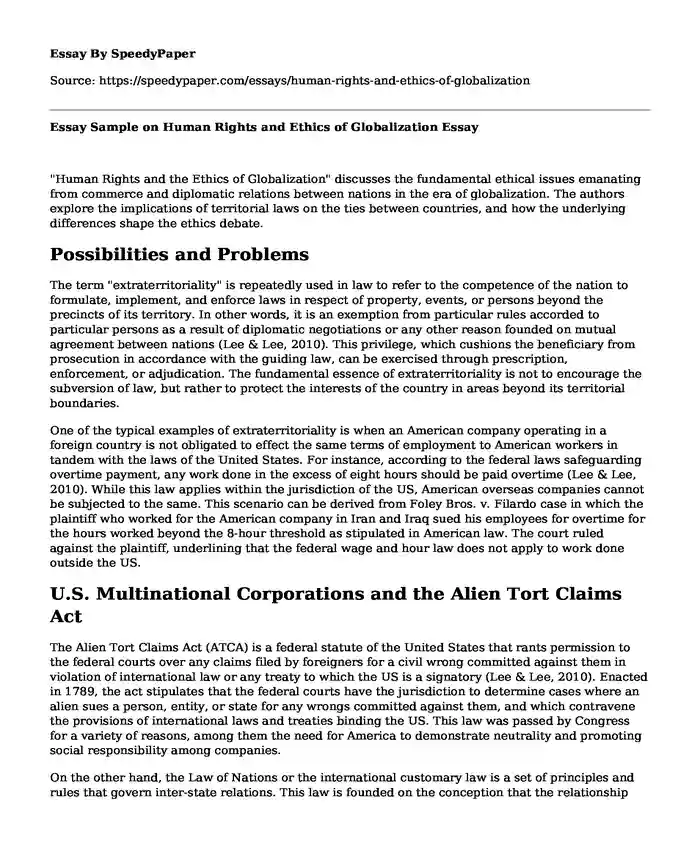
| Type of paper: | Case study |
| Categories: | Globalization International relations Human rights |
| Pages: | 3 |
| Wordcount: | 627 words |
"Human Rights and the Ethics of Globalization" discusses the fundamental ethical issues emanating from commerce and diplomatic relations between nations in the era of globalization. The authors explore the implications of territorial laws on the ties between countries, and how the underlying differences shape the ethics debate.
Possibilities and Problems
The term "extraterritoriality" is repeatedly used in law to refer to the competence of the nation to formulate, implement, and enforce laws in respect of property, events, or persons beyond the precincts of its territory. In other words, it is an exemption from particular rules accorded to particular persons as a result of diplomatic negotiations or any other reason founded on mutual agreement between nations (Lee & Lee, 2010). This privilege, which cushions the beneficiary from prosecution in accordance with the guiding law, can be exercised through prescription, enforcement, or adjudication. The fundamental essence of extraterritoriality is not to encourage the subversion of law, but rather to protect the interests of the country in areas beyond its territorial boundaries.
One of the typical examples of extraterritoriality is when an American company operating in a foreign country is not obligated to effect the same terms of employment to American workers in tandem with the laws of the United States. For instance, according to the federal laws safeguarding overtime payment, any work done in the excess of eight hours should be paid overtime (Lee & Lee, 2010). While this law applies within the jurisdiction of the US, American overseas companies cannot be subjected to the same. This scenario can be derived from Foley Bros. v. Filardo case in which the plaintiff who worked for the American company in Iran and Iraq sued his employees for overtime for the hours worked beyond the 8-hour threshold as stipulated in American law. The court ruled against the plaintiff, underlining that the federal wage and hour law does not apply to work done outside the US.
U.S. Multinational Corporations and the Alien Tort Claims Act
The Alien Tort Claims Act (ATCA) is a federal statute of the United States that rants permission to the federal courts over any claims filed by foreigners for a civil wrong committed against them in violation of international law or any treaty to which the US is a signatory (Lee & Lee, 2010). Enacted in 1789, the act stipulates that the federal courts have the jurisdiction to determine cases where an alien sues a person, entity, or state for any wrongs committed against them, and which contravene the provisions of international laws and treaties binding the US. This law was passed by Congress for a variety of reasons, among them the need for America to demonstrate neutrality and promoting social responsibility among companies.
On the other hand, the Law of Nations or the international customary law is a set of principles and rules that govern inter-state relations. This law is founded on the conception that the relationship between nations, regions, and people of diverse geographical locations cannot be realized unless there are universal standards guiding the same (Von Glahn, & Taulbee, 2017). The law of nations can be found in public law of the respective nations, the general practice of the countries, and in judicial determinations that recognize and facilitate the enforcement of international law. Ultimately, the law of nations provides a common judicial ground for nations to articulate for and exercise certain laws that are central to the enhancement of global collaboration. Ultimately, the norms and values underlined by the law of nations cannot be preempted by treaties, implying that they are obligatory for all nations.
References
Lee, D. E., & Lee, E. J. (2010). Human rights and the ethics of globalization. Cambridge University Press.
Von Glahn, G., & Taulbee, J. L. (2017). Law among nations: an introduction to public international law. Routledge.
Cite this page
Essay Sample on Human Rights and Ethics of Globalization. (2023, Jan 20). Retrieved from https://speedypaper.net/essays/human-rights-and-ethics-of-globalization
Request Removal
If you are the original author of this essay and no longer wish to have it published on the SpeedyPaper website, please click below to request its removal:
- Are We Too Dependent on Technology Essay - Free Sample to Check
- Essay Example on Nuclear Waste Problem
- Is Art Useless? Check Out the Answer in This Free Essay
- Description of the patient's current status
- Superstitious Beliefs and Happiness: A Correlation Study of Young Adults
- Free Essay - "The Ride of a Lifetime" by Robert Iger
- Annotated Bibliograpgy Example - The Impact of Minimum Wage: Insights from Recent Studies
Popular categories




